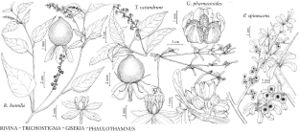Trichostigma octandrum
in H. G. A. Engler, Pflanzenr. 83[IV,39]: 109. 1909.
Common names: Hoopvine
Basionym: Rivina octandra Linnaeus Cent. Pl. II, 9. 1756
Revision as of 19:59, 24 September 2019 by FNA>Volume Importer
Plants suberect, to 10 m, glabrous. Leaves: petiole 0.6–3.5(–5) cm; blade elliptic, elliptic-lanceolate or oblong to ovate, to 15 × 7 cm, base rounded to cuneate, apex acuminate or acute to obtuse. Racemes 5–10 cm; peduncle 1.3–3 cm; pedicel 3–10 mm. Flowers sepals white or greenish white to red or purplish in age, ovate to obovate, 3–6 mm. Berries 4–6 mm diam. Seeds black, lenticular, 4–5 mm.
Phenology: Flowering spring.
Habitat: Hammocks, roadsides, and disturbed sites
Elevation: 0-30 m
Distribution
Fla., Mexico, West Indies, Central America, South America.
Discussion
In the West Indies, strips of bark from Trichostigma octandrum are woven into attractive baskets; the flexible stems are used as barrel hoops. The young leaves, cooked in one or two waters, are said to be a nutritious vegetable.
Selected References
None.
Lower Taxa
None.
